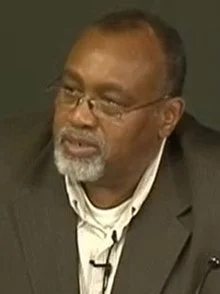
Glenn Loury
Glenn Loury is an American economist, academic, and author. He is the Merton P. Stoltz Professor of the Social Sciences and Professor of Economics at Brown University, where he has taught since 2005. At the age of 33, Loury became the first African American professor of economics at Harvard University to gain tenure. Loury achieved prominence during the Reagan Era as a leading black conservative intellectual. In the mid 1990s, following a period of seclusion, he adopted more progressive views. Today, Loury has somewhat re-aligned with views of the American right, with The New York Times describing his political orientation in 2020 as "conservative-leaning." In 1972, he received his B.A. degree in mathematics from Northwestern University. He received his Ph.D. in economics from the Massachusetts Institute of Technology in 1976, writing his dissertation, "Essays in the Theory of the Distribution of Income", under the supervision of Robert M. Solow. At MIT he met his future wife, Linda Datcher Loury.
Books Mentioned in this Podcast with Jordan Peterson & Glenn Loury:
Understanding Economic Inequality and Cognitive Ability – Insights from Glenn Loury’s Journey
Glenn Loury’s journey from a working-class background in Chicago to becoming a renowned economist and professor at Brown University offers valuable insights into the complex interplay between economic inequality, cognitive ability, and societal structures. Loury’s life story and academic work provide a unique perspective on these issues, especially considering his shifting political views over the years.
Early Life and Academic Career
Loury’s story began in Chicago, where a calculus teacher recognized his exceptional mathematical skills. This recognition led him to Northwestern University on a full scholarship, opening doors to a world of higher education and academic opportunity. His passion for applying mathematics to social questions guided him towards economics, finding a natural fit in exploring social issues with quantitative rigor and disciplined logic.
Theoretical Insights into Economic Models
In his academic career, Loury delved into the application of mathematics to economic models, an approach that started gaining momentum in the early 20th century. He discussed how theoretical economics, using tools like differential and integral calculus, can offer deep insights closely connected to the real world. Loury used Adam Smith’s “invisible hand” theorem as an example to illustrate how formalizing economic concepts can clarify the underlying assumptions and conditions necessary for the efficient functioning of capitalist enterprises.
Cognitive Ability and Economic Success
An intriguing aspect of Loury’s discussions centers around cognitive ability (g) and its relationship with economic success. The notion that cognitive ability is a significant predictor of long-term economic outcomes, despite the unpredictability of the future, challenges the idea of centralized decision-making in economies. It highlights the complexity involved in understanding and catering to diverse individual capacities within the socioeconomic framework.
Gender Differences and Occupational Choices
Loury’s analysis extends to gender differences in occupational choices, emphasizing how societal norms and biological factors influence these decisions. He notes that while there are significant overlaps between men and women, interests often diverge, leading to different occupational patterns. This observation is particularly evident in fields requiring specific cognitive abilities, like mathematics, where men tend to dominate at the extremes despite the general cognitive similarity between genders.
Racial Disparities and Incarceration
Another crucial aspect of Loury’s work is the examination of racial disparities in incarceration rates in the United States. He argues that while these disparities may not be entirely due to contemporary discrimination, they reflect broader systemic issues deeply rooted in society’s history. Loury suggests that addressing these disparities is critical for maintaining social order and stability, even if they predominantly reflect disparities in criminal offending.
Economic Inequality and Social Dynamics
Loury also explores the Pareto principle in the context of economic inequality, highlighting how a small number of individuals often produce a significant portion of outcomes in various fields. This phenomenon, exacerbated by technological advancements, creates challenges in managing economic inequality and ensuring fair opportunities for all. Loury’s discussions underline the importance of creating diverse opportunities for success in a rapidly evolving economic landscape.
Cognitive Ability and Social Challenges
A significant part of Loury’s discourse revolves around the implications of cognitive ability variations among individuals. He stresses the need to acknowledge these differences and explore potential interventions, such as educational programs, to ameliorate their impact. Loury’s analysis of programs like Head Start reveals the complexities involved in enhancing cognitive abilities and other traits like resilience and perseverance.
Personal Political Shifts
Reflecting on his personal political shifts, Loury describes how his experiences shaped his views. Initially aligning with liberal ideologies, he later embraced a more free-market perspective, influenced by his academic training and observations of inner-city challenges. However, Loury’s journey also included periods of reevaluation, illustrating the dynamic nature of political beliefs influenced by personal and societal developments.
Conclusion
Glenn Loury’s experiences and academic contributions offer vital insights into the intricate connections between economic inequality, cognitive ability, and societal structures. His journey from a mathematical prodigy in Chicago to a prominent economist underscores the impact of educational opportunities and personal determination. Through his work, Loury invites a deeper understanding of the multifaceted nature of these issues, highlighting the importance of nuanced approaches in addressing economic and social disparities.






